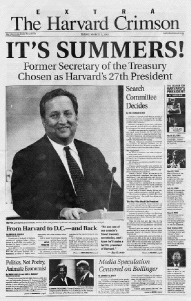 |
Members of Harvard's Board of Overseers and top University deans learned the news from the Crimson. So did the New York Times, the Associated Press, and the Boston Globe. On the Internet, Slate Magazine's "Today's Papers" declared the Crimson's coup the most interesting part of the search story.
For Crimson editors, the story began long before the paper broke the news. Having beaten the competition to report Neil L. Rudenstine's selection as president in 1991, the newspaper's staff made cracking the search its top priority. Six reporters were assigned to cover the search, more than on any other beat. The editors also took unusual steps to protect their sources, explicitly reminding the entire news staff by e-mail to keep any information secret--even from roommates and parents. (Search committee members and other knowledgeable University officials were difficult to contact and extremely secretive, according to Harvard Independent news editor Matthew Yglesias, who said he had no idea who the Crimson's sources were.)
Because the presidential search committee met in secret and, apart from one news briefing in mid October, declined public comment on the selection process, Crimson reporters tracked down committee meeting places by calling members' offices to ask if they were out of town. Then they called local hotels to see if the members had reserved rooms. Whenever reporters learned that a meeting was planned, they staked out the hotel, sitting in the lobby for hours at a time. "It got so [Harvard] Corporation members would spot them and wave," said Vasugi V. Ganeshananthan '02, the associate managing editor who led search coverage.
The paper spent thousands of dollars on airplane trips to New York and Washington, D.C., estimated Crimson president C. Matthew MacInnis '02. And there were other expenses. When two reporters on the case were threatened with eviction from the lobby of one New York City hotel because they weren't guests, they rented a room for $280 a night.
By February 20, the Crimson was reporting that only four candidates remained. On February 22, the Globe ran a story suggesting University of Michigan president Lee C. Bollinger was the leading candidate. That same week, the Independent ran a profile on Bollinger, calling him "the man who will likely lead this university starting in July."
Then, on March 9, the Crimson got the tip it had been waiting for: a decision had been made. Summers was the search committee's choice. But editors had to confirm the story, so the search team started making calls. Around 5 p.m., about four hours after reporters first heard of the selection, a second source confirmed the news. By 5:16 p.m., a story headlined "It's Summers!" was on the Crimson's website. (The on-line story received more than 2,000 hits in the next several days.) When the presses started to roll, the story had been confirmed by four independent sources. For Crimson editors, however, the story continued: freshman reporter David Y. Gellis was already on a plane to Washington to congratulate Summers in person. When Gellis showed up on the president-to-be's doorstep with flowers, a card, and a bottle of wine, Summers accepted the gifts, but declined comment.
No other newspaper was able to confirm the selection independently for its Saturday edition. When the Times and the Globe finally did identify Summers as the search committee's pick in their Sunday papers, both credited the Crimson with the scoop.
~Rachel Kovner





